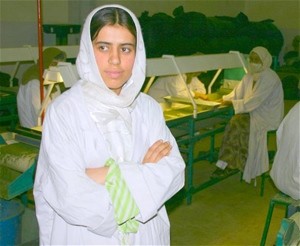
Noria Sedequi supervises 25 women working in the Vegetable Dehydrates Factory.
Jeremy Foster RAMP/Afghanistan
Dehydrated vegetable factory provides opportunities for jobs and access to new markets.
“With the money I am making at the factory, I will be able to help my brothers and sisters pay for a university education.” —Noria Sedequi
1 MAY 2006 | PARWAN PROVINCE
“With the money I am making at the factory, I will be able to help my brothers and sisters pay for a university education.”—Noria Sedequi
Noria Sedequi and her family of ten lived in Pakistan for eight years during the Taliban regime. They returned to Parwan Province, about 60 kilometers north of Kabul, Afghanistan, in 2001. Jobs were scarce and Noria realized that there were even fewer jobs in her community for women who wanted to work.
Around the same time Noria’s family returned to Afghanistan, a demand for processing bulk quantities of dehydrated vegetables such as, coriander, turnips, cabbage, green beans, cauliflower, spinach, carrots, and zucchini was growing. In January 2005, Afghanistan’s first Vegetable Dehydrates Factory was opened by the United States Agency for International Development (USAID) through the Rebuilding Agricultural Markets Program in the fertile Shomali Plains of Parwan Province. Noria began working in the factory soon after it opened and was quickly promoted to supervisor, overseeing the work of 25 women.
“I came to the factory earlier than the other workers every morning, and left later,” says Noria. “I’m smart and I work hard.” At the factory, Noria knows she has job security and a regular monthly salary. She has also learned English, acquired technical skills associated with operating factory machinery, and gained basic business management skills.
Noria’s family is very supportive of her work at the factory. She and her father, a guard at a local hospital, provide the only source of income for the family.
In addition to opening up jobs for women such as Noria, the project provided 1,200 local farmers with vegetable seeds and fertilizer, and contracted them to supply the factory with fresh produce. The factory hired 96 laborers to clean, weigh, dice, sort, and test the quality of vegetables, operate drying machinery, and package dehydrated vegetables for export. Importers in the United Kingdom and Germany include the dehydrated vegetables in their packaging of instant soups.







Comment
Make a general inquiry or suggest an improvement.